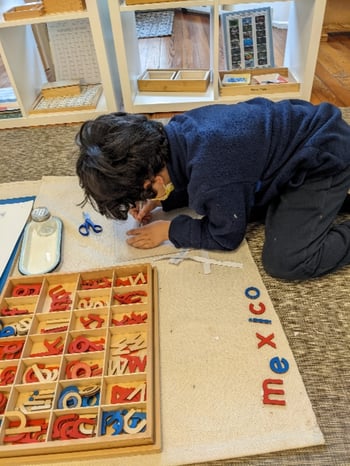
There are certain key phases that Montessori guides use regularly to support learners throughout their day. These common sayings encourage independence and a shared sense of culture. To have consistency at home and in the studio, we welcome parents to try using some of these phrases. Let’s review a few:
“Can you show me how you try?”
Learners do many things for themselves in and out of the studio. They put away their belongings each morning and dress themselves for the outdoors. They store their lunch in the kitchen and retrieve it before mealtime. They know where to find their spare masks if their current ones are too wet. They take joy in knowing they can take care of themselves! Sometimes, however, they get overwhelmed. In these moments they may be too frazzled to see that they are indeed capable of tackling a given problem. For instance, this past week, a learner presented his gloves to a guide and was convinced that he wouldn't be able to put them on. He asked for assistance. In response to this and other similar requests learners frequently hear, “Can you show me how you try?” After hearing this, the learner tried and was successful in putting on his gloves. The learner was so proud!
“Which part can I help you with?”
Of course, learners will face tasks that are too challenging. For instance, after doing a “big work” with the moveable alphabet, a learner may be too tired to put all of the letters back in their respective boxes. Fatigue has complicated what would otherwise be a possible task. Learners often express their frustration at this moment by walking away. Learners will hear a guide ask, “Do you need help?” The likely answer will be “Yes!” Then a guide will ask, “Which part can I help you with?” The learner might indicate she can put away the vowels while the guide replaces the consonants. This cooperation still allows the learner to exercise self-reliance while also receiving much-needed assistance.
“Is this going to be successful?”
Learners will sometimes need reminders about the limits in the studio and outdoor area. For instance, during circle time the learners practice raising their hands in order to take turns speaking. Sometimes learners are so excited about sitting next to a friend that they find themselves engrossed in a side conversation. At this moment, we might ask the pair, “Is this going to be successful?” Instead of reprimanding or imposing consequences, we are inviting the learners to “make better choices” in order to remain seated in their desired spot while also respecting the needs of the group.
“We are peaceful with our ______”
Learners engage early on with the concept of peace in the studio. This term comes to represent many things. It encompasses the way learners move safely and slowly through the studio. It means using kind language when speaking to another. It means keeping our hands to ourselves. It means listening and respecting another learner’s “message” when they are expressing a need or boundary. It means taking care of our library books. In moments when learners might forget these things, guides remind them that “we are peaceful with our _______” (words, bodies, and materials). Using “we” also reminds learners that we are part of a community and being together means having shared values. It is more appealing to be invited into the group than it is to simply be told what to do.
“I see you worked really hard on that!”
Learners love feeling capable. Therefore, when they ask if a guide likes their work or in some other fashion seeks approval, the guide will instead acknowledge the effort they made. Guides will also ask learners how they feel about their work or if they can elaborate on what they did. Learners walk away knowing that the value of their work stands independent of the guides’ judgment. Instead of hearing that their handwriting is “beautiful,” a learner will hear that they concentrated for such a long time or that their script is very legible!